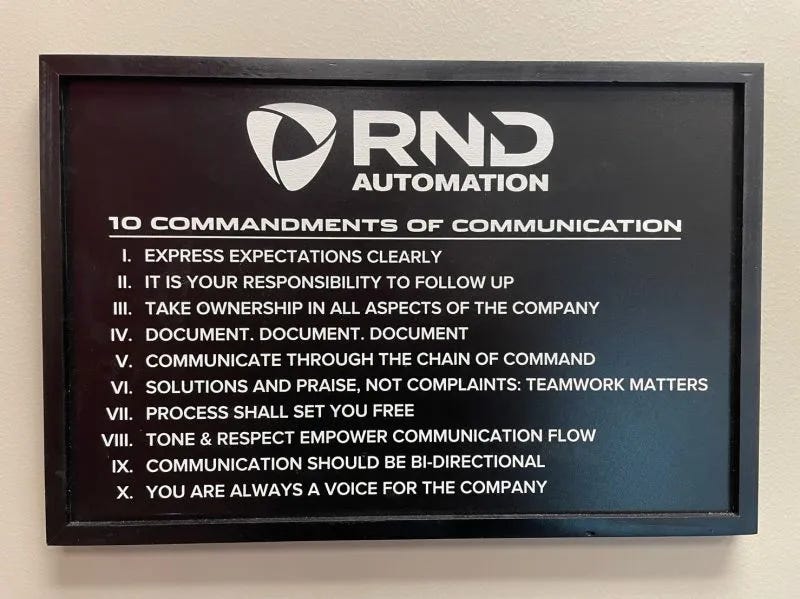6 Important Business Lessons I Learned Later Than I Should
But was able to fix before they became major issues…
I Have (Had?) No Idea What I’m Doing
This was the thought that permeated my brain for the first few years after I started RND Automation. I had left an automation company, recruited two of my top engineers and we dove in head first into the world of custom automation. While we were experts in automation and robotics, I had no formal financial training and barely knew a P&L from a balance sheet (and probably broke more than a few IRS codes in the process). But that’s what you do when you are starting a business. You just do it and figure out the problems as you go along.
As Richard Branson once said
If somebody offers you an amazing opportunity but you are not sure you can do it, say yes, then learn how to do it later.
Looking back however, some of my mistakes were bigger than others. And they could have cost me dearly. Thanks to advice from others, my business coaches and no shortages of luck, I survived these mistakes. However they could have been much more and I’m here today to share some of them.
1. Have a Line of Credit
We were lucky to land a project on day one at RND, and from there, we kept funding new projects with cash flow alone. By year five, my business coaches pointed out how risky this was—less than 1% of businesses survive that way. A small cash flow hiccup could have wiped us out, and we likely missed bigger opportunities by being too cautious.
The next day, I called a bank and secured a $1 million line of credit in 30 minutes. More importantly, we used it strategically—borrowing and repaying small amounts to build a credit history. When we later needed a $2M increase, the bank approved it without hesitation.
Lesson learned: Build a relationship with a local bank before you need funding. If you wait until you’re desperate, it’s already too late.
2. Hire More Sales (and pay them well)
The right number of salespeople is N+1, where N is however many you have now. Sales drive everything—without them, even the best engineering and operations teams are useless.
For too long, I was RND’s primary salesperson while also running the company, doing neither job as well as I should have. I hired a few salespeople, but when they didn’t work out, I fell back into old habits. Big mistake. Eventually, I brought on experienced, high-performing salespeople—who weren’t cheap. But they delivered, and I happily wrote their commission checks every month. Too many business owners resent high-earning salespeople. Don’t. If they’re making good money, so are you.
Always be building your “virtual bench.” Even if you don’t need more salespeople today, keep an eye out for top talent. The best ones won’t be available for long, and when they are, you want to be their first call.
3. Delegate
Letting go is one of the hardest things for a Type-A entrepreneur, but it’s essential for growth. You simply can’t do it all—and if you try, you’ll limit your company’s potential.
I was lucky to hire talented, trustworthy managers early on. But even with a strong team, I still held onto certain tasks, convinced no one could do them as well as I could. That mindset nearly broke me. Eventually, I had to let go—and when I did, my team thrived.
I tell this story often about my (eventual) VP of Operations who was employee #1. Over time I gave him more and more autonomy to make decisions and his reports to me followed a progression…
Hey, what should I do here?
Sean, I think I should do this… Do you agree?
Well, I did this... I hope it was OK.
Oh that? I took care of that weeks ago and never told you. All’s good!
When you hit that last stage you know you have made it and have successfully been able to hand over those tasks that you, as a leader, don’t need on your plate.
4. Work On Process & Standardization
At RND, we developed the 10 Commandments of Communication, and one of the most important is “Process Shall Set You Free.” A business can run like a well-oiled machine—until something disrupts it. Whether it’s an unexpected absence, a key employee leaving, or rapid growth, without documented processes, chaos follows.
Tribal knowledge is one of the biggest risks in a technical company. If critical tasks only exist in someone’s head, they can disappear in an instant. The solution? Write it down. The next time you handle a routine task only you can do, document the steps, test them, and store them with the rest of your procedures. That way, when someone else needs to take over, they can follow the process seamlessly—freeing you up to focus on bigger things.
5. Cash Flow is More Important Than Profit
In automation, long project cycles mean cash can be tight even when your books show a profit. I learned (sometimes painfully) that managing cash flow is more critical than just looking at a P&L statement. Having a line of credit (Lesson #1) helped, but beyond that, we needed to negotiate better payment terms with customers, invoice aggressively, and keep a close eye on working capital. A company can survive without profit for a while, but it won’t last a week without cash.
If you are curious about how to manage cash in a project based business I wrote an article on that subject last year.
6. Know When to Say No
When you start a business, every opportunity feels like a blessing. But not all projects are worth the headache. Early on, I took on jobs that weren’t a great fit—either too far outside our core expertise, too small to be profitable, or with clients that turned out to be nightmares. In hindsight, learning to say “no” would have saved me time, money, and stress. The best companies know their strengths and don’t chase every dollar. This is where it’s important to have a core set of “niches” in which your company excels. You need to be a subject matter expert at several things but you can never be the expert in everything.
Conclusion
We all make mistakes when running a business. And often there is no one there to stop you. I hope you take a few of these mistakes that I made and correct them quicker than I did. If you do then your chances of success rise drastically.
The Automation Navigator is brought to you by Automation AMA, a company founded and run by an industry leader in assembly, robotics and packaging. Automation AMA offers a variety of services to help you on your automation journey or to help fine tune your engineering, sales, operations and business development departments. Learn more at www.automationAMA.com or shoot me an introductory email.






